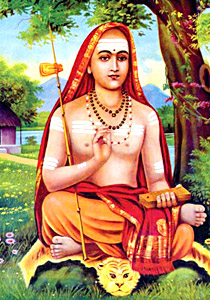 Hindu Religious Leaders
Hindu Religious Leaders
India, a land known for its rich cultural heritage, takes pride in the diverse theories and principles showcased by its Hindu religious leaders. Through their profound teachings, these leaders have not only verbalized the importance of Hinduism but have also made significant contributions to society. From the historical figures like Chaitanya Mahaprabhu, Ramanuja, Ramakrishna, and Adi Shankara to the present-day luminaries such as Mirabai, Sai Baba of Shirdi, Gurumayi Chidvilasananda, Paramahansa Yogananda, and Sadhguru, the principles they espoused have left an indelible mark on Hinduism and its global influence.
Adi Sankaracharya: A Philosopher of Advaita Vedanta
Adi Sankaracharya, an Indian philosopher, stands out as a prominent Hindu religious leader. His great work lies in combining the doctrine of Advaita Vedanta, a sub-school of Vedanta. Sankaracharya`s teachings emphasized the non-dual nature of reality, highlighting the ultimate oneness of the individual soul (Atman) and the universal consciousness (Brahman). His philosophy has been instrumental in shaping the understanding of Hindu spirituality and promoting the path of self-realization.
Ramanujacharya: The Exponent of Visistadvaita
Ramanujacharya, a theologian, philosopher, and scriptural exegete, holds a significant place in Hindu philosophy. He expounded Visistadvaita, one of the classical interpretations of the dominant Vedanta school. Ramanujacharya`s teachings emphasized the concept of qualified non-dualism, asserting the individual`s eternal relationship with God. By emphasizing devotion (bhakti) as a means of attaining liberation, he brought a profound shift in the way Hinduism was practiced and understood.
Madhva Charya: The Chief Proponent of Tattva Vada
Madhva Charya is another revered figure among Hindu religious leaders in India. He is known as the chief proponent of Tattva Vada, a philosophy that emphasized the reality of duality and the eternal distinction between the individual soul, God, and the material world. Madhva Charya`s teachings laid emphasis on the importance of devotion, self-discipline, and adherence to scriptural authority.
Dayananda Saraswati: Propagator of Vedic Religion
Dayananda Saraswati played a crucial role in ushering a new wave of belief and credence. He advocated a return to a purer form of Vedic religion, focusing on an eternal, omnipotent, impersonal God. Dayananda Saraswati`s teachings emphasized the study and understanding of the Vedas, promoting social reforms, and advocating for the upliftment of women and the eradication of social evils.
Ramakrishna Paramhamsa: A Spiritual Hindu Leader
Ramakrishna Paramhamsa, one of the notable spiritual and religious leaders of Hinduism, left an indelible mark on the spiritual landscape of India. His teachings centered around the harmony of different religious paths, emphasizing that all genuine spiritual paths lead to the same ultimate truth. Ramakrishna`s disciple, Swami Vivekananda, further propagated his teachings, becoming a figure of great importance in the development of modern Hindu self-understanding and in formulating the West`s view of Hinduism.
Influx of Hindu Teachings to the West
During the 1960s and 1970s, Hinduism experienced a great influx of teachers and ideas that reached the West. Prominent among them was Aurobindo Ghose, who was involved with the Indian independence movement and later became a spiritual teacher. Despite being jailed for his involvement in political activities, Aurobindo Ghose`s teachings focused on integral yoga, the synthesis of spiritual practices, and the transformation of human consciousness.
Bhaktivedanta Prabhupada
Another significant figure who brought Hindu teachings to the West was Bhaktivedanta Prabhupada. In 1965, he introduced the Hare Krishna movement, also known as the International Society for Krishna Consciousness (ISKCON), which gained widespread popularity. Prabhupada`s teachings emphasized devotion to Lord Krishna and the chanting of the Hare Krishna mantra as a means of attaining spiritual enlightenment.
Swami Muktananda
Swami Muktananda, the founder of Siddha Yoga, was another influential Hindu religious leader who left an impact on the West. Siddha Yoga focuses on awakening the inner divine power through meditation, self-inquiry, and the grace of a realized Guru. Muktananda`s teachings attracted numerous followers and inspired many to embark on the spiritual path.
Anandamayi Ma
Not all Hindu teachers who have had a profound impact on the West have left India. Anandamayi Ma, revered as a living deity and identified with the Goddess Durga, had a devoted following both in India and abroad. Her teachings emphasized devotion, self-surrender, and the cultivation of inner purity.
Sathya Sai Baba
Sathya Sai Baba, another influential figure, commanded a large following in India and internationally. Known for his miraculous abilities, including producing sacred ash and images from his fingertips, Sai Baba`s teachings focused on the unity of all religions, service to humanity, and the cultivation of love and compassion.
Swami Shivananda
Swami Shivananda from Rishikesh, a disciple of Swami Vivekananda, taught the Neo-Vedanta philosophy formulated by his Guru. His teachings emphasized the practical application of Vedantic principles in daily life and the integration of spiritual practices with social welfare activities. Swami Shivananda`s disciples, such as Swami Chinmayananda, have established centers worldwide to disseminate the teachings of Neo-Vedanta.
The influx of Hindu teachers and ideas to the West, including the teachings of these renowned Hindu religious leaders, has contributed to the global spread of Hinduism. However, it is important to recognize that these teachings are diverse and may differ significantly from one teacher to another.
As Hinduism continues to evolve and interact with different cultures, its teachings and principles are being interpreted and integrated into various spiritual and philosophical frameworks. This dynamic process of cultural exchange and adaptation has shaped what is now recognized as Global Hinduism, a diverse and vibrant spiritual tradition that transcends geographical boundaries.




















